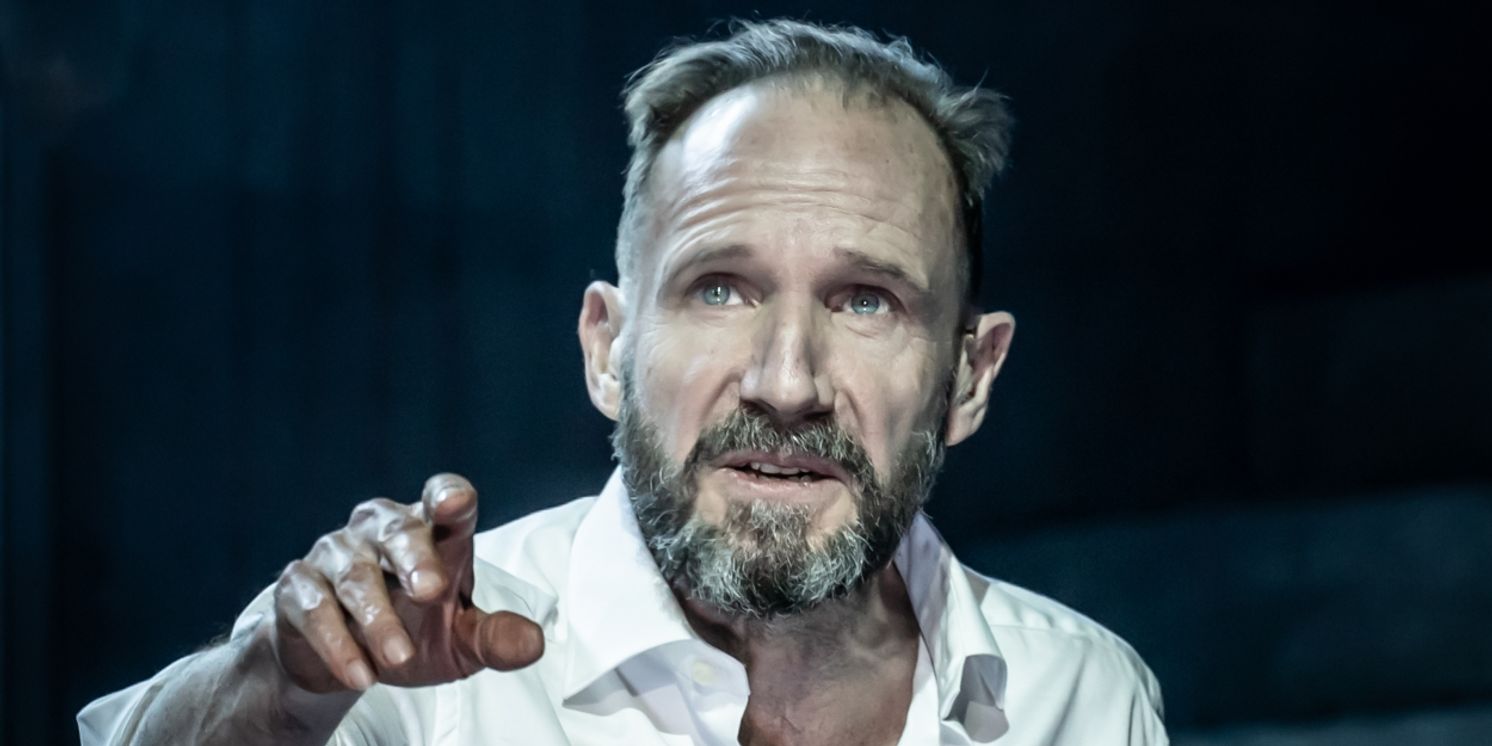Review: MACBETH at Shakespeare Theatre Company
At 1301 W St. NE through May 5

Shakespeare Theatre Company’s Macbeth announces its pomp and circumstance right away but takes time to show its more delicate center. In this production by STC's Artistic Director Simon Godwin, an ask from leading actor Ralph Fiennes led to staging Macbeth outside the company's regular downtown space. After a run in similarly industrial venues in Liverpool, Edinburgh, and London, this production takes place in a 40,000-square-foot warehouse in Brentwood. The space is decorated with imposing “M” insignia projected onto the floors of the cavern-like halls leading to the theatre. One of these areas includes a war-scorched landscape, complete with the burned skeleton of a car. Beyond this scene is a small stage, which fills up with surprisingly intimate performances.
Macbeth is Shakespeare’s shortest tragedy, and it tells the story of ruthless ambition that spurs a chain of murders. When Scottish general Macbeth is visited by three witches, or “weird sisters,” who predict that he will be king, he’s seized by an appetite for power. His wife, Lady Macbeth, encourages him to commit increasingly vicious acts to seize and keep the throne—and both must fight psyche-twisting guilt.
The backdrop to this is a devastating war, and STC accents their battle-torn set (Frankie Bradshaw) with crumbling concrete, floor-shaking blasts (sound by Christopher Shutt), and painfully bright flashes (lighting design by Jai Morjaria). It’s an abrasive combination that raises the tension before we see any blood spill. Sparse set pieces include a tantalizing crystal bowl filled with water, waiting to be turned red like Chekov’s gun. The modern costumes (also Frankie Bradshaw) match the scenery, showing luxury in domestic zones and aggressively dressed generals on the battlefield.
When we first see Macbeth, he appears in full wartime gear. It doesn’t take long for us to see through his toughness as he’s stopped by the weird sisters (Lucy Mangan, Danielle Fiamanya, Lola Shalam). Ralph Fiennes’ Macbeth defies the gravitas of a performer with his status stepping into a monumental role. Leaning into the character’s clumsiness and uncertainty, this Macbeth fumbles as he tries to assert his masculinity. Fiennes thrives in Macbeth’s self-doubt, discovering his next steps in the moment rather than scheming them into action. His “Tomorrow and tomorrow and tomorrow” speech shows Macbeth at his most convicted—yet even what seems like declaring meaninglessness here reveals a twisted grief in Fiennes’ understated performance.
Lady Macbeth, often played as an anchor of conviction (at least, until her eventual breakdown), was fun and erratic in the hands of Indira Varma. Her performance of Lady Macbeth’s iconic villainous lines felt more spontaneous than calculated. Instead of serving as a foil to Macbeth, Varma mirrored Fiennes’ approach by focusing on her character’s instability and anxiety. Their electric dynamic—characterized by a giddy sexuality that melts into queasiness—is a large part of what caused an unexpected amount of laughter throughout the play.
While Fiennes and Varma threw their characters into the unknown, Ben Turner’s Macduff offered a striking contrast of groundedness. Turner, who brilliantly played Salar in STC’s The Jungle last spring, was absolutely outstanding. His portrayal of unthinkable grief diverged sharply from Fiennes' parallel experience just a few scenes later, building an exciting setup for their final scene together. Even if you’ve seen many interpretations of Macbeth, this last confrontation is riveting.
STC’s Macbeth highlights brutal pairs: war and domestic life, grief and humor, brief words and permanent consequences. While the setting could feel unassuming—indeed, audiences must make their way through the parking lot of a Home Depot when arriving via metro—it also shows how extravagant it is to create a theatre space from scratch. This over-the-top, hollowed-out aesthetic fits the world of the play, where titles and status belie a fear of impermanence. Combined with raw, vulnerable performances, this is a powerful take on the timeless tragedy.
—
Running time: 2 hours and 45 minutes, including intermission
Shakespeare Theatre Company’s Macbeth will be at 1301 W St. NE through May 5. This location is in Brentwood, located 20 minutes from STC’s Harman Hall. Paid parking is available, and STC provides a free shuttle from the metro to the venue. Tickets can be purchased at ShakespeareTheatre.org, and STC is the only authorized seller of tickets for the DC performances. Macbeth is mostly sold out, but STC has partnered with TodayTix to offer a limited number of $20 tickets for every performance. While not included in the STC’s content warning, the production contains extremely loud sounds and bright lights (as well as, of course, graphic murders).
Reader Reviews
Videos

